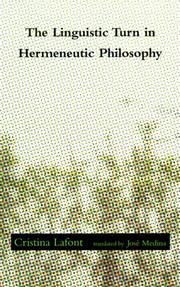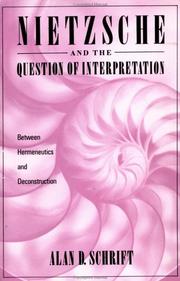| Listing 1 - 3 of 3 |
Sort by
|
Book
ISBN: 3110328097 311032850X 9783868380323 Year: 2009 Volume: n.s., v. 9 Publisher: De Gruyter
Abstract | Keywords | Export | Availability | Bookmark
 Loading...
Loading...Choose an application
- Reference Manager
- EndNote
- RefWorks (Direct export to RefWorks)
Bei der Studie handelt es sich um eine Paragraphen für Paragraphen erläuternde Interpretation der ""Philosophischen Untersuchungen"". Sie wendet sich an alle an Wittgensteins Philosophie Interessierte, insbesondere an Studierende und Schüler. Inhaltlich setzt sie einen Schwerpunkt auf die Sprachphilosophie. Didaktisch versucht sie, den Text Schritt für Schritt verständlich zu machen, und Wittgensteins - oft implizit bleibende - Auseinandersetzungen mit anderen philosophischen Positionen (der philosophischen Tradition und der analytischen Sprachphilosophie) deutlicher hervortreten zu lassen. Da
Hermeneutics -- History -- 19th century. --- Language and languages -- Philosophy -- History -- 19th century. --- Language and languages -- Philosophy -- History -- 20th century. --- Philosophy & Religion --- Philosophy --- Language and languages --- Philosophy. --- Wittgenstein, Ludwig, --- Wei-tʻe-ken-ssu-tʻan, --- Wei-tʻe-ken-ssu-tʻan, Lu-te-wei-hsi, --- Wittgenstein, L. --- Vitgenshteĭn, L., --- Wei-ken-ssu-tʻan, --- Pitʻŭgensyutʻain, --- Vitgenshteĭn, Li︠u︡dvig, --- Weitegenshitan, --- Wittgenstein, Ludovicus, --- Vitgenshtaĭn, Ludvig, --- ויטגנשטיין, לודוויג --- 维特根斯坦, --- Wittgenstein, Ludwig Josef Johann,

ISBN: 0262122170 026262169X 0262277867 0585190097 9780585190099 9780262277860 9780262122177 9780262621694 Year: 1999 Volume: *17 Publisher: Cambridge, Mass.
Abstract | Keywords | Export | Availability | Bookmark
 Loading...
Loading...Choose an application
- Reference Manager
- EndNote
- RefWorks (Direct export to RefWorks)
Annotation The linguistic turn in German philosophy was initiated in the eighteenth century in the work of Johann Georg Hamann, Johann Gottfried von Herder, and Wilhelm von Humboldt. It was further developed in this century by Martin Heidegger, and Hans-Georg Gadamer extended its influence to contemporary philosophers such as Karl-Otto Apel and J?Habermas. This tradition focuses on the world-disclosing dimension of language, emphasizing its communicative over its cognitive function. Although this study is concerned primarily with the German tradition of linguistic philosophy, it is very much informed by the parallel linguistic turn in Anglo-American philosophy, especially the development of theories of direct reference. Cristina Lafont draws upon Hilary Putnam's work in particular to criticize the linguistic idealism and relativism of the German tradition, which she traces back to the assumption that meaning determines reference. Part I is a reconstruction of the linguistic turn in German philosophy from Hamann to Gadamer. Part II offers the deepest account to date of Habermas's approach to language. Part III shows how the shortcomings of German linguistic philosophy can be avoided by developing a consistent and more defensible version of Habermas' theory of communicative rationality.
Philosophy of language --- Theory of knowledge --- anno 1800-1999 --- Germany --- Language and languages --- Hermeneutics --- Philosophy, German --- Philosophy --- History --- -Hermeneutics --- -Language and languages --- -Philosophy, German --- -Foreign languages --- Languages --- Anthropology --- Communication --- Ethnology --- Information theory --- Meaning (Psychology) --- Philology --- Linguistics --- German philosophy --- Interpretation, Methodology of --- Criticism --- -History --- -Philosophy --- -Philosophy of language --- Foreign languages --- 19th century --- Philosophy [German ] --- 20th century --- SOCIAL SCIENCES/Political Science/Political & Social Theory --- PHILOSOPHY/General --- Language and languages - Philosophy - History - 19th century --- Hermeneutics - History - 19th century --- Philosophy, German - 19th century --- Language and languages - Philosophy - History - 20th century --- Hermeneutics - History - 20th century --- Philosophy, German - 20th century

ISBN: 0415903122 0415903114 9780415903110 9780415903127 Year: 1990 Publisher: New York (N.Y.): Routledge
Abstract | Keywords | Export | Availability | Bookmark
 Loading...
Loading...Choose an application
- Reference Manager
- EndNote
- RefWorks (Direct export to RefWorks)
Theory of knowledge --- Nietzsche, Friedrich W. --- Deconstructie --- Deconstruction --- Déconstruction --- Hermeneutics --- Deconstruction. --- History --- -Hermeneutics --- -Interpretation, Methodology of --- Criticism --- Semiotics and literature --- -History --- -Derrida, Jacques --- Heidegger, Martin --- -Nietzsche, Friedrich Wilhelm --- -Derrida, J. --- Derida, Žak --- Derrida, Jackes --- Derrida, Zhak --- Deridah, Z'aḳ --- Deridā, Jāka --- Dirīdā, Jāk --- Деррида, Жак --- Contributions in hermeneutics. --- Contributions in hermeneutics --- Influence --- -Contributions in hermeneutics. --- Nietzsche, Friedrich --- Interpretation, Methodology of --- Derrida, Jacques. --- Nietzsche, Friedrich Wilhelm --- Nietzsche, Friederich --- Influence. --- Derrida, J. --- דרידה, ז'אק --- 19th century --- Derrida, Jacques --- Nietzsche, Friedrich Wilhelm, 1844-1900 - Contributions in hermeneutics. --- Nietzsche, Frederich Wilhelm, 1844-1900 - Influence. --- Hermeneutics - History - 19th century. --- Heidegger, Martin, 1889-1976 - Contributions in hermeneutics. --- Derrida, Jacques - Contributions in hermeneutics. --- Khaĭdegger, Martin, --- Haĭdegger, Martin, --- Hīdajar, Mārtin, --- Hai-te-ko, --- Haidegŏ, --- Chaitenger, Martinos, --- Chaitenker, Martinos, --- Chaintenger, Martin, --- Khaĭdeger, Martin, --- Hai-te-ko-erh, --- Haideger, Marṭinn, --- Heidegger, M. --- Haideger, Martin, --- Hajdeger, Martin, --- הייגדר, מרתין --- היידגר, מרטין --- היידגר, מרטין, --- 海德格尔, --- Chaintenker, Martin, --- Hāydigir, Mārtīn, --- Hīdigir, Mārtīn, --- هاىدگر, مارتين, --- هىدگر, مارتين, --- Hermeneutics - History - 20th century.
| Listing 1 - 3 of 3 |
Sort by
|

 Search
Search Feedback
Feedback About UniCat
About UniCat  Help
Help News
News